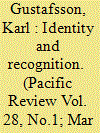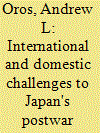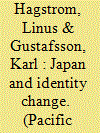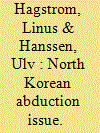|
|
|
Sort Order |
|
|
|
Items / Page
|
|
|
|
|
|
|
| Srl | Item |
| 1 |
ID:
137144


|
|
|
|
|
| Summary/Abstract |
In the 1990s, Japanese views of China were relatively positive. In the 2000s, however, views of China have deteriorated markedly and China has increasingly come to be seen as ‘anti-Japanese’. How can these developments, which took place despite increased economic interdependence, be understood? One seemingly obvious explanation is the occurrence of ‘anti-Japanese’ incidents in China since the mid-2000s. I suggest that these incidents per se do not fully explain the puzzle. Protests against other countries occasionally occur and may influence public opinion. Nonetheless, the interpretation of such events arguably determines their significance. Demonstrations may be seen as legitimate or spontaneous. If understood as denying recognition of an actor's self-identity, the causes of such incidents are likely to have considerably deeper and more severe consequences than what would otherwise be the case. Through an analysis of Japanese parliamentary debates and newspaper editorials, the paper demonstrates that the Chinese government has come to be seen as denying Japan's self-identity as a peaceful state that has provided China with substantial amounts of official development aid (ODA) during the post-war era. This is mainly because China teaches patriotic education, which is viewed as the root cause of ‘anti-Japanese’ incidents. China, then, is not regarded as ‘anti-Japanese’ merely because of protests against Japan and attacks on Japanese material interests but for denying a key component of Japan's self-image. Moreover, the analysis shows that explicit Chinese statements recognising Japan's self-identity have been highly praised in Japan. The article concludes that if China recognises Japan's self-understanding of its identity as peaceful, Japan is more likely to stick to this identity and act accordingly whereas Chinese denials of it might empower Japanese actors who seek to move away from this identity and ‘normalise’ Japan, for example, by revising the pacifist Article Nine of the Japanese constitution.
|
|
|
|
|
|
|
|
|
|
|
|
|
|
|
|
| 2 |
ID:
137147


|
|
|
|
|
| Summary/Abstract |
Japan today is widely portrayed as on the verge of a significant identity shift that could lead to dramatic new security policies. Yet, Japan's first formal national security strategy, adopted in December 2013, proclaims repeatedly Japan's long-standing ‘peace-loving’ policies and principles. Why does a conservative government with high levels of popular support not pursue policies more in line with views widely reported to be central to its values and outlook? The answer lies in Japan's long-standing security identity of domestic antimilitarism, an identity under siege to a degree not seen since its creation over 50 years ago, but – as evidenced in Japan's new national strategy document – one that continues to shape both the framing of Japan's national security debates and the institutions of Japan's postwar security policy-making process. Relational approaches to identity construction illuminate challenges to Japan's dominant security identity, but a focus on domestic institutions and electoral politics offers the best course for modeling identity construction and predicting its future resilience.
|
|
|
|
|
|
|
|
|
|
|
|
|
|
|
|
| 3 |
ID:
137135


|
|
|
|
|
| Summary/Abstract |
Two approaches to identity have been employed to explore issues in Japan's international relations. One views identity as constituted by domestic norms and culture, and as constitutive of interests, which in turn cause behaviour. Proponents view Japan's ‘pacifist’ and ‘antimilitarist’ identity as inherently stable and likely to change only as a result of material factors. In the other approach, ‘Japan’ emerges and changes through processes of differentiation vis-à-vis ‘Others’. Neither ‘domestic’ nor ‘material’ factors can exist outside of such identity constructions. We argue that the second, relational, approach is more theoretically sound, but begs three questions. First, how can different identity constructions in relation to numerous Others be synthesised and understood comprehensively? Second, how can continuity and change be handled in the same relational framework? Third, what is the point of analysing identity in relational terms? This article addresses the first two questions by introducing an analytical framework consisting of three mutually interacting layers of identity construction. Based on the articles in this special issue, we argue that identity entrepreneurs and emotions are particularly likely to contribute to change within this model. We address the third question by stressing common ground with the first approach: identity enables and constrains behaviour. In the case of Japan, changes in identity construction highlighted by the articles in this special issue forebode a political agenda centred on strengthening Japan militarily.
|
|
|
|
|
|
|
|
|
|
|
|
|
|
|
|
| 4 |
ID:
137141


|
|
|
|
|
| Summary/Abstract |
After Kim Jong-il's confession in 2002 that North Korean agents had abducted thirteen Japanese citizens in the 1970s and 1980s, North Korea has become the most detested country in Japan, and the normalisation of bilateral relations has been put on the back burner. The abduction issue has taken precedence in Japan even over North Korea's development of nuclear weapons and long-range missiles. It has also grossly overshadowed the atrocities for which Imperial Japan was responsible in the 20th century. Why has there been such strong emphasis on an issue that could be disregarded as comparatively ‘less important’? This article understands the ascendency of the abduction issue as the epitome of an identity shift under way in Japan – from the identity of a curiously ‘peaceful’ and inherently ‘abnormal’ state, to that of a more ‘normal’ one. The differentiation of North Korea as ‘abnormal’ emphasises Japan's own (claim to) ‘normality’. Indeed, by incarnating the perils of Japan's own ‘pacifist’ ‘abnormality’, which has been so central to the collective sense of Japanese ‘Self’ in the post-war period, the abduction issue has become a very emotional argument for Japan's ‘normalisation’ in security and defence terms. The transformation from ‘abnormal’ to ‘normal’ is further enabled by Japan trading places with North Korea in the discourse, so that Japan is defined as ‘victim’ (rather than former aggressor) and North Korea as ‘aggressor’ (rather than former victim). What is at stake here is the question whether Japan is ‘normalising’ or ‘remilitarising’, and the role of the abduction issue discourse in enabling such foreign and security policy change.
|
|
|
|
|
|
|
|
|
|
|
|
|
|
|
|
| 5 |
ID:
137136


|
|
|
|
|
| Summary/Abstract |
Asia is narrated in Japanese foreign policy pronouncements as an opportunity as well as a threat. Despite the purported transformation from militarism to pacifism since August 1945, the reified images of Asia as an ‘entity out there’ remain resilient. The image of a dangerous Asia prompted Japan to engage in its programme of colonialism before the War and compels policy makers to address territorial disputes with Asian neighbours today. Simultaneously, Asia persistently symbolises an opportunity for Tokyo to exploit. Hence, despite the psychological rupture of August 1945, reified Asia remains a reality in Japanese foreign policy.
|
|
|
|
|
|
|
|
|
|
|
|
|
|
|
|
| 6 |
ID:
137143


|
|
|
|
|
| Summary/Abstract |
Since 1945, the United States (US) has served as a focal point of both Left-wing and Right-wing Japanese nationalism. Both sides argued that the US was an arrogant hegemon that unjustly robbed Japan of its autonomy, and prevented Japan from achieving its own ideal national identity. Both sides frequently demanded that Japan should be more ‘resolute’ and resist unfair demands emanating from the US. In recent years, however, both camps are increasingly using the same rhetoric to criticise the Japanese government's China policy. China is also being depicted as an overbearing state that unfairly browbeats Japan into making diplomatic concessions. Given the similarities between the portrayal of China and the US, has China now become a nationalist focal point for both the Japanese Left and Right? Utilising constructivist insights, this article seeks to shed light on this question, by examining how the Japanese Right and Left portray China, and explores the implications for Japan's China policy.
|
|
|
|
|
|
|
|
|
|
|
|
|
|
|
|
| 7 |
ID:
137138


|
|
|
|
|
| Summary/Abstract |
This paper joins the debate on Japan's territorial dispute with South Korea over the Dokdo/Takeshima islets. Informed by the ontological security framework of analysis, this paper seeks to explain the decision to adopt the ‘Takeshima Day’ ordinance by the Shimane Prefectural Assembly and the subsequent ascendance of ‘Takeshima’ to the fore of Japan's identity construction vis-à-vis the Korean ‘other’. In this paper, I distinguish between two processes: one that led to the adoption of the ordinance and another that resulted in the entrenchment of ‘Takeshima’ in Japan's identity construction vis-à-vis the Korean ‘other’. The paper argues that the former process should be understood within the context of Shimane Prefecture's distinct identity construction vis-à-vis Tokyo, while the latter can be attributed to recent changes in Japan–Korea relations unrelated to the territorial dispute per se.
|
|
|
|
|
|
|
|
|
|
|
|
|
|
|
|
|
|
|
|
|